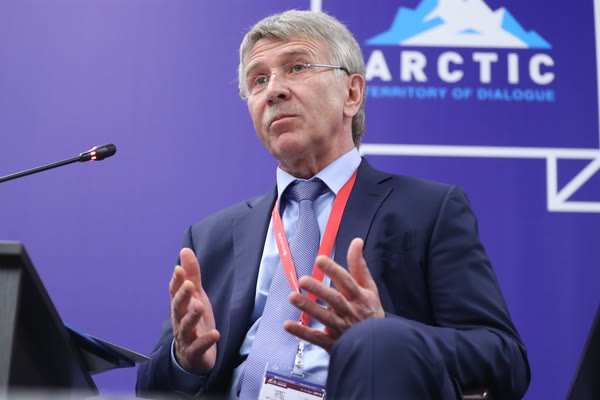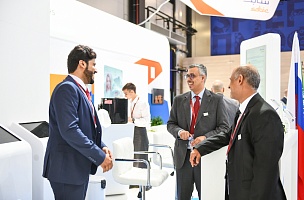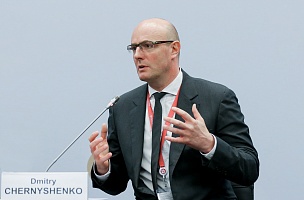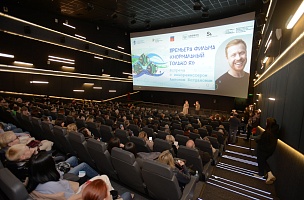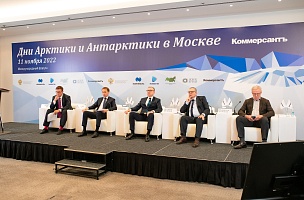KEY CONCLUSIONS
The Arctic has great potential for attracting investment
“The Arctic is a truly strategically important region for Russia. The Arctic is rich in oil, gas and other minerals. It produces one tenth of the global oil and a quarter of natural gas. As for the contribution of the Arctic to the Russian economy, it accounts for about 6% of Russia’s GDP, and drives 11% of investments in fixed assets,” Alexander Ivlev, CIS Managing Partner, Deputy Regional Accounts Leader for Central, Eastern and Southeastern Europe & Central Asia, EY.
“The concept of LNG-2 will ensure technological opportunities to increase LNG production in the Arctic which would be very competitive in terms of costs,” Leonid Mikhelson, Chairman of the Management Board, Member of the Board of Directors, NOVATEK.
Government pays special attention to projects in the Arctic zone
“There has been a pivot in the government’s attitude to projects in the Arctic. We saw that when new governing bodies were formed, and additional authority has been given to the Ministry since May last year,” Roman Trotsenko, Founder, Chairman of the Board of Directors, AEON Corporation.
“The Russian Government played a decisive role in the implementation of the Yamal LNG project. There was a decree, an intergovernmental agreement was concluded with China. The government guaranteed permanent taxation rules for us. About half of the investment in this project was provided by shareholders, but the timing was bad: Novatek came under sectoral financial sanctions, and it was very important that at that particular time we received support from the National Wealth Fund in the amount of 150 billion roubles and financing from our banks,” Leonid Mikhelson, Chairman of the Management Board, Member of the Board of Directors, NOVATEK.
“We see how actively the Ministry of the Far East and Arctic has taken on the difficult issue of discussing all kinds of support for such difficult projects as ours,” Roman Trotsenko, Founder, Chairman of the Board of Directors, AEON Corporation.
Successful projects in the Arctic drive the development of the entire Russian economy
“We are now implementing a new project: Arctic LNG-2. It has more capacity [than the Yamal LNG project, – Ed.], about 20 million tons already, and the investment will be 30% less, about 1.2 trillion roubles. A number of major contracts for this project have already been signed; Total has already joined as a stakeholder, we are negotiating with partners from China and Arab countries,” Leonid Mikhelson, Chairman of the Management Board, Member of the Board of Directors, NOVATEK.
“The Northern Sea Route is the key to the development of the Arctic economy: both for projects that are being implemented and those that are being considered for future implementation and require support,” Alexander Kozlov, Minister for the Development of the Russian Far East and Arctic.
“According to our estimates, LNG projects will provide work for about 800 Russian enterprises and create about 80,000 jobs all over Russia,” Leonid Mikhelson, Chairman of the Management Board, Member of the Board of Directors, NOVATEK.
PROBLEMS
Regional governments lack authority to provide benefits to investors
“The Ministry of Finance amended the tax code and starting from 2023 regional governments have virtually no right to provide benefits to companies. I propose that such authority should be reinstated in the tax code, so that for at least 12 years the regions could provide tax benefits for Arctic projects and their suppliers,” Leonid Mikhelson, Chairman of the Management Board, Member of the Board of Directors, NOVATEK.
Tax system weakness
“The current fiscal conditions were adopted by our Government at the time when the price of oil exceeded USD 100, and there were no external sanctions or restrictions on technology. Quite some time has passed since then, oil price has been visibly volatile, and it is growing up a little now, but, at any rate, it does not reach the level that was taken into account when the decisions about current taxation were made,” Andrey Patrushev Deputy Chief Executive Officer, Shelf Projects Development, Gazprom Neft.
Logistics and transport problems
“A very important issue is that we have a lot of blind spots, from the passage of ships to the availability of ships and icebreakers, so that there are enough of them,” Alexander Kozlov, Minister for the Development of the Russian Far East and Arctic.
SOLUTIONS
Propagating the successful mechanisms of territorial development to the Arctic zone
“It is very important that the government pays much attention to this subject, provided that we already have a very good experience of developing certain regions. Probably the best example is the development of the Russian Far East. Over the past 5 to 7 years, a lot has been done to create proper infrastructure, to attract human capital. The process continues, and most importantly, the numbers reflect that,” Alexander Ivlev, CIS Managing Partner, Deputy Regional Accounts Leader for Central, Eastern and Southeastern Europe & Central Asia, EY.
“The operations of all development institutions in the Russian Far East will be expanded to the Arctic region. This means that we will help with the allocation of land, we will supervise each project individually, we will assist in terms of protection against excessive oversight, we will provide funding at a reduced interest rate,” Yury Trutnev, Deputy Prime Minister of the Russian Federation and Presidential Plenipotentiary Envoy to the Far Eastern Federal District.
“We propose, as we did previously, to make changes to the tax code, so that the companies that operate in the Arctic zone could apply the increased depreciation coefficient of 2, once assets are put into operation after 1 January 2020. The main thing that we have always asked for is to extend the taxation rules for prioritized regional investment projects – those that are in place for the regions of the Far Eastern Federal District and certain regions of the Siberian Federal District – to the entire Arctic zone,” Dmitry Pristanskov, State Secretary – Vice-President, MMC Norilsk Nickel.
Government support for investments in the Arctic region at all levels
“Today, we have four groups of projects that benefit from preferences: offshore hydrocarbon production, continental hydrocarbon production, liquefied natural gas production and other projects not included in the first three groups,” Yury Trutnev, Deputy Prime Minister of the Russian Federation and Presidential Plenipotentiary Envoy to the Far Eastern Federal District.
“Speaking of income tax, we believe that the rate of 7.6% for the entire period of the object’s operation is fair, and even if it is profitable, we are happy to share the profits with the government,” Roman Trotsenko, Founder, Chairman of the Board of Directors, AEON Corporation.
“We want to ensure that the preferences for the first three groups of projects are completely harmonized with the vision of companies that operate on the shelf and are engaged in the production of LNG. There are few such companies. <...> Generally, we will talk about reducing or removing taxes on profits, land or property,” Yury Trutnev, Deputy Prime Minister of the Russian Federation and Presidential Plenipotentiary Envoy to the Far Eastern Federal District.
“We try to support businesses to the best of our capability, but we understand that most of the projects in the region have advanced to the stage of implementation already. Yet, we are ready to apply various support measures to new projects: we have a special law to support investors,” Alexander Tsybulskiy, Governor of Nenets Autonomous Region.


